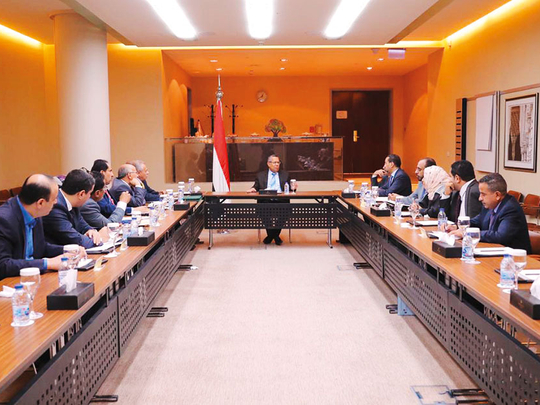
Cairo: UN peace envoy for Yemen Martin Griffiths on Thursday launched a new attempt to revive peace talks for the war-devastated country amid tensions in the south.
On Wednesday, Southern Transitional Council called for protests against the government, stoking fears of further unrest in the country suffering from acute humanitarian and economic woes.
Griffiths on Thursday met in Abu Dhabi with Aidarous Al Zubaidi, the council’s head, on its possible participation in any new talks for peace.
The meeting tackled the situation in Yemen’s south and economic collapse, according to a statement on the council’s website.
The Yemeni government warned against “acts or rioting”, the official news agency Saba reported. The government urged Yemenis to reject what it termed “calls for chaos, disintegration and division”.
Yemen has been roiled by war since late 2014 when Iran-allied Al Houthi militants deposed the internationally recognised government and overran the capital Sana’a.
Last month, Al Houthis undermined a UN-sponsored bid to restart Yemen’s long-stalled peace process after they failed to appear in Geneva for indirect talks with the government.
The war has wreaked havoc on Yemenis, pushing the impoverished country to the verge of famine. The rebels are accused of using civilians as human shields and militarizing civil facilities.
The UN children’s agency, Unicef, said it suspended cash transfers to 9 million of Yemen’s poorest people under pressure from Al Houthis.
Unicef said Wednesday it made the decision after it was unable to set up a call centre to get feedback from beneficiaries, without providing further details.
Two individuals familiar with the programme told AP the rebels who control northern Yemen hindered the launch of the call centre because they feared it might reveal their manipulation of the cash transfers. The two spoke on condition of anonymity, fearing reprisals from the militia.
Last week, Al Houthi security authorities banned the country director of the Adventist Development and Relief Agency (ADRA) from returning to Yemen, according to the two individuals.
The agency has been under pressure from Al Houthis to use the militants’ beneficiary lists in aid distribution and to use Al Houthi-linked staffers in ADRA-run health facilities. When ADRA Yemen chief Ephraim Palmero objected, he was notified that he wouldn’t be allowed to return to the country, the individuals told AP.
ADRA President Jonathan Duffy described working conditions in Yemen as a “very disturbing situation” and said the withdrawal of Palmero’s travel credentials is a “threat against delivery” of humanitarian needs.
The suspended Unicef payment is the third since the project was launched in August 2017. The agency has said the cash transfers are a “lifeline” to a third of Yemen’s people and “contribute to avert the risk of famine and allowed targeted families to buy food and medicine.”
In recent weeks, government forces, supported by the coalition air power, have regained territory in several areas of Yemen from Al Houthis.
Yemeni troops have advanced in the northern province of Saada, the stronghold of the extremists, an army commander said.
Backed by coalition jets, the government forces retook control of a series of mountains in Saada’s district of Baqim, Brig. Yassir Al Harthi told 26 September Net, linked to the Yemeni Defence Ministry.
The progress followed fierce battles in which at least 25 Al Houthi militiamen were killed and others captured including field commanders, he added.
Al Houthis have used Saada as a pad for launching hundreds of missiles into neighbouring Saudi Arabia since 2015.












